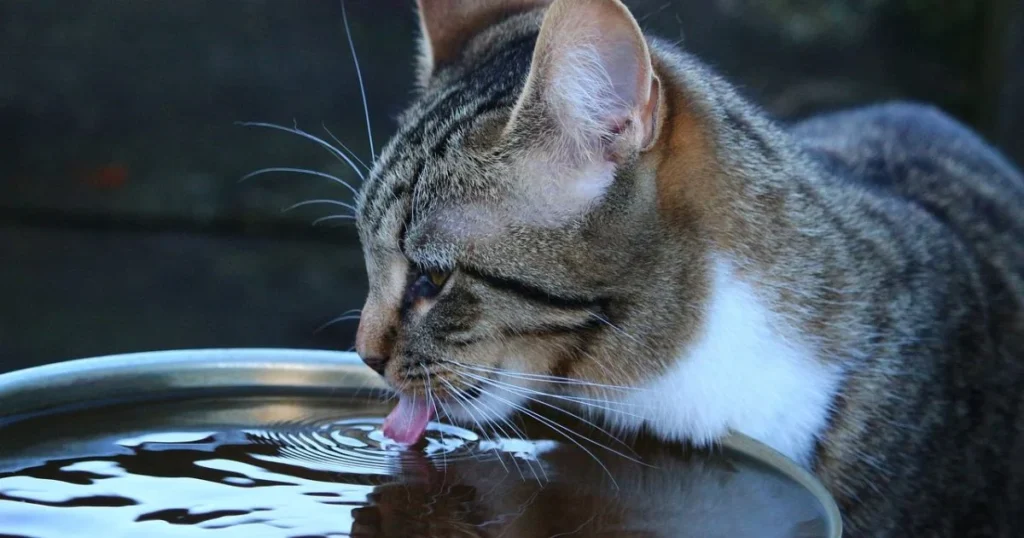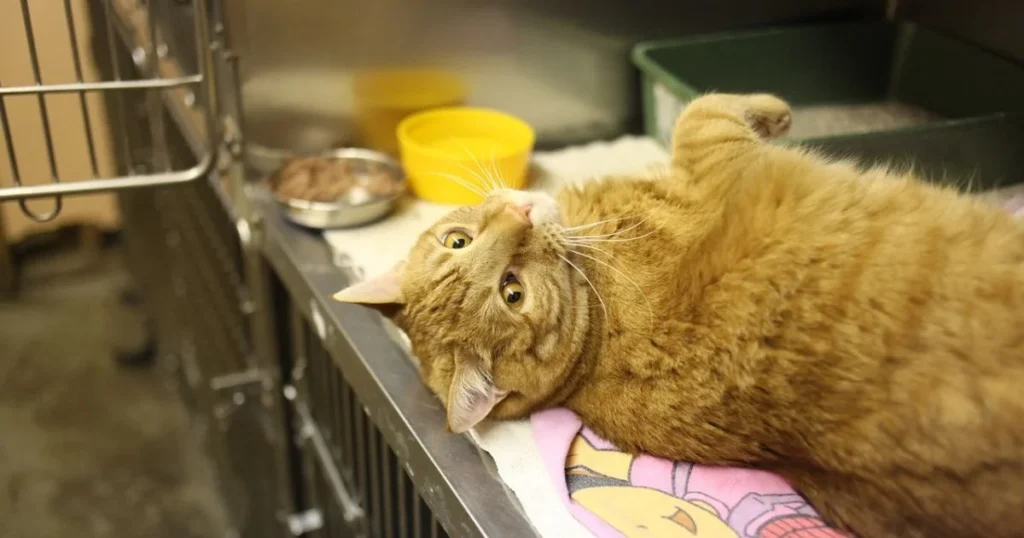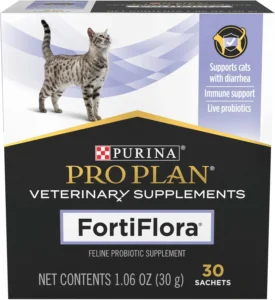Treating Cat Diarrhea: Effective Strategies for Relief and Recovery
Table of Contents
Seeing your cat struggle with diarrhea is heartbreaking. The mess and discomfort can feel overwhelming. But, there are ways to help your cat feel better.
This guide will show you how to treat your cat’s diarrhea. We’ll cover diet changes and home remedies. These can help your cat recover from digestive issues.
First, find out why your cat has diarrhea. It could be bad food, sensitivity, or a health issue. Knowing the cause helps you find the right treatment.
By changing your cat’s diet and using supportive therapies, you can help their gut health. This will help your cat feel better and recover faster.
Adjust Your Cat’s Diet
When dealing with cat diarrhea, it’s important not to stop feeding your cat. This can slow down their recovery. Instead, simplify their diet by removing treats and table scraps. Make sure to give them a complete cat food every day.
If you’ve recently changed your cat’s food and they still have diarrhea, try going back to the old food. This might help their symptoms get better.
Chronic adverse reactions to food can also cause problems. Trying a hypoallergenic or low-antigen diet might help if your cat has food intolerances or allergies. Some cat foods made from duck or rabbit can be good for cats with these issues.
Simplify Your Cat’s Diet
- Eliminate treats and table scraps
- Provide a nutritionally complete cat food daily
- Consider switching back to the previous diet if diarrhea persists after a recent change
Explore Hypoallergenic or Low-Antigen Diets
If your cat has chronic adverse reactions to food, a hypoallergenic or low-antigen diet might help. It can offer relief for food intolerances or allergies.
| Diet Type | Description |
|---|---|
| Hypoallergenic | Formulated with novel protein sources, such as duck or rabbit, to minimize allergic reactions. |
| Low-Antigen | Contains limited, highly digestible ingredients to reduce the risk of triggering food sensitivities. |
“Some over-the-counter low-antigen cat foods made from novel protein sources like duck or rabbit can be effective for certain cats.”
Treating Cat Diarrhea: Opt For Anti-Diarrheal Drugs
When your cat has diarrhea, not all human medicines are safe for them. But, kaolin-pectin supplements are usually okay. They can help manage your cat’s diarrhea symptoms.
For kaolin-pectin, give 1 teaspoon for every 5 pounds of your cat’s weight every 4 to 6 hours. Always talk to your vet before giving your cat any medicine. Some products have changed and could be harmful.
Anti-diarrheal drugs can help, but only if your vet says it’s okay. The wrong medicine can make things worse. Your vet will find the best and safest treatment for your cat.
Some human medicines, like imodium or loperamide, are bad for cats. They can be toxic. Always check with your vet before giving your cat any medicine, even if it says it’s safe for pets.
By following your vet’s advice and using safe supplements like kaolin-pectin, you can help your cat feel better. This way, you ensure their safety and well-being.
Support Gut Health with Probiotics
Keeping a healthy balance of bacteria in your cat’s gut is key for digestion. If this balance gets upset, like after stress or antibiotics, cat diarrhea can stick around. Probiotics can help restore gut health in cats by maintaining a balanced gut microbiome, leading to healthy digestion again.
Probiotics are good bacteria and yeasts that help the digestive system. They can help cats with diarrhea by balancing the gut’s bacteria. Diarrhea in cats can be caused by many things, including food changes, parasites, and infections. If your cat has diarrhea that won’t go away, it’s important to see a vet.
Probiotics can make gut flora better, boost immunity, stop bad bacteria, and help absorb nutrients. When picking probiotics for cats, look at the bacteria strains, ingredients, analysis, brand, form, and vet advice.
Some top probiotic picks for cats with diarrhea include:
- Feline Digestive Health Probiotic Blend
- Purrfect Probiotic Capsules
- Happy Kitty Probiotic Chews
- WellCat Probiotic Sprinkle
Each probiotic has its own benefits and things to think about. By using probiotics, you can help your cat’s diarrhea and improve their digestion.
| Probiotic Supplement | Key Features | Benefits |
|---|---|---|
| DrFormulas Nexabiotic Probiotics for Cats Powder | Contains Saccharomyces Boulardii and Lactobacillus Acidophilus | Treats diarrhea in pets, promotes gut health |
| Honest Paws Pre + Probiotics | Emphasizes safety, efficacy, quality, and ease of use | Supports digestive health in cats |
| Purina FortiFlora Cat Probiotic Powder | 1 billion CFUs per gram | Effective probiotic support for cats |
Adding probiotics to your cat’s care can help restore gut health in cats and maintain a balanced gut microbiome. This can help with cat diarrhea and keep their digestion healthy.
Promote Hydration and Electrolyte Balance
Keeping your cat hydrated is key when they have diarrhea. Dehydration can lead to serious issues like electrolyte imbalances. To help, focus on these important steps:
Offer Fresh Water and Diluted Broths
Make sure your cat always has clean, fresh water. Change their water bowls often. You can also give them diluted chicken or beef broth to help them stay hydrated. The broth should be low-sodium and at room temperature to make them want to drink.
Switch to Canned Wet Food
Switching to canned wet food can help your cat drink more water. Wet food has a lot of moisture, which helps prevent dehydration. You can also add a tablespoon of warm water to their canned food to make it more appealing.
By keeping your cat hydrated and balanced in electrolytes, they can recover faster from diarrhea. Make sure they always have access to fresh water, diluted broths, and wet food. These steps are great for improving your cat’s hydration during tough times.

Fiber Considerations: Low or High?
Fiber plays a big role in managing cat diarrhea. The right amount can make a big difference. It depends on the cause of the diarrhea if a low-fiber or high-fiber diet is better.
Benefits of a Low-Fiber Diet
If your cat has big, but not often, diarrhea, a low-fiber diet might help. This diet makes stool firmer and cuts down on how often your cat goes. It has about 6% fiber, which is easier on your cat’s stomach.
When Fiber Supplementation Helps
But, some diarrhea types do better with more fiber. If your cat goes often but only a little bit, more fiber can help. You can start with a small amount of unflavored psyllium or canned pumpkin in their food.
For constipation, a high-fiber diet is good. It has about 12% fiber. Foods like Royal Canin® Veterinary Diet and Hill’s® Science Diet are made to help move things along.
Managing your cat’s diarrhea needs a vet’s help. They can figure out the cause and what diet is best. It might be a low-fiber diet or adding fiber.
When to Seek Veterinary Assistance
Some mild cases of cat diarrhea can be handled at home. But, knowing when to see a vet is crucial. If your cat’s diarrhea is severe, has other symptoms, or lasts more than 48 hours, call your vet.
Sudden diarrhea that lasts over 2 days needs vet attention. Cats with diarrhea for 48 hours, especially if they’re tired and won’t eat, may need medical help in about 40% of cases.
Also, if your cat goes to the litter box more often, has more stool, or shows signs of poisoning, see a vet. Less than 5% of cats get diarrhea from eating poisonous plants or toxins, which is a medical emergency.
“Chronic enteropathy, lasting for a minimum of three weeks, affects fewer than 10% of cats with diarrhea, while gastrointestinal tract cancers may be the cause in around 8% of cases.”
If you see blood in your cat’s diarrhea or it’s very severe, call your emergency vet right away. Diarrhea with vomiting also means your cat needs quick medical help.
Lethargy in cats with diarrhea means they need vet care. It could be dehydration or another health issue. Untreated diarrhea can cause dehydration and kidney problems.
Chronic diarrhea can lead to nutritional deficiencies, weight loss, and malnutrition. This can cause neurological problems, weakness, poor coordination, eyesight issues, and organ failure. If your cat’s diarrhea gets worse or doesn’t go away, get professional help.

Recognizing Diarrhea Severity in Cats
Understanding how severe cat diarrhea is important. Mild cases might show up as occasional loose stools without other symptoms. But, severe cases can have lots of watery stool, blood, or mucus, and look dark.
Mild Diarrhea Symptoms
Mild cat diarrhea shows up in a few ways:
- Loose or watery stool that’s not too frequent
- No vomiting, tiredness, or loss of appetite
- It usually doesn’t last long, a few hours to a couple of days
Severe Diarrhea Symptoms
Severe cat diarrhea is different:
- It happens a lot, with lots of watery or bloody stool
- Stool might have mucus or look dark and tarry
- It can come with vomiting, dehydration, weight loss, or feeling very tired
- It lasts more than two to three weeks
Knowing how bad your cat’s diarrhea is helps you decide what to do. You might just need to change their diet, or they might need a vet.
Common Causes of Cat Diarrhea
Cat diarrhea can be a frustrating and concerning issue. Understanding the potential causes can help you and your veterinarian find the right treatment. Common causes include dietary factors, health conditions, and environmental stressors.
Dietary factors often play a role, with spoiled food, dietary indiscretions, and food allergies or intolerances being common culprits. Cats may develop sensitivities to ingredients like beef, dairy, or fish. This can lead to gastrointestinal distress and diarrhea.
Parasitic infections, such as worms or protozoa, can also cause diarrhea in cats. Bacterial, viral, and fungal infections can lead to gastrointestinal issues and diarrhea. Inflammatory bowel disease (IBD) is another condition that can cause persistent diarrhea, weight loss, and vomiting.
Organ dysfunctions, like liver or kidney disease, are more common in older cats. They can manifest with diarrhea as a symptom. Exposure to household toxins, such as cleaning products or certain plants, can also trigger diarrhea in felines.
Stress is another factor that can impact a cat’s digestive health, leading to stress-related diarrhea. Underlying medical conditions, including hyperthyroidism or diabetes, can also have diarrhea as a symptom.
While mild diarrhea in cats is common, recurring or severe diarrhea may indicate a more serious issue. It’s important to address it promptly by a veterinarian.
| Cause | Description |
|---|---|
| Dietary Factors | Spoiled food, dietary indiscretions, food allergies or intolerances |
| Parasitic Infections | Worms, protozoa |
| Bacterial, Viral, and Fungal Infections | Gastrointestinal distress and diarrhea |
| Inflammatory Bowel Disease (IBD) | Persistent diarrhea, weight loss, vomiting |
| Organ Dysfunctions | Liver or kidney disease, more common in older cats |
| Toxin Exposure | Household cleaners, plants |
| Stress | Stress-related diarrhea |
| Underlying Medical Conditions | Hyperthyroidism, diabetes |
By understanding the potential causes of cat diarrhea, you and your veterinarian can work together. You can identify the underlying issue and develop an effective treatment plan. This will help your feline friend feel better and recover quickly.
Conclusion
Treating cat diarrhea needs a full plan to help and stop it from coming back. You can change your cat’s diet, use special medicines, and add probiotics. Also, make sure they drink enough water. If your cat’s diarrhea doesn’t get better, it might be a sign of a bigger problem. Always watch your cat’s health and see a vet if you need to.
To manage cat diarrhea, start with a simple diet. Look for foods that are easy on their stomach. Use medicines made for diarrhea and add probiotics to their food. Drinking enough water and eating the right foods are also important. These steps can help your cat feel better and stop diarrhea from happening again.
In short, treating cat diarrhea is a big job that needs a team effort. Work with your vet to find out why it’s happening and how to fix it. With the right care, your cat can get back to being healthy and happy, without diarrhea.
FAQ
Should I stop feeding my cat if they have diarrhea?
No, don’t stop feeding your cat if they have diarrhea. This can slow down their healing. Instead, simplify their diet by removing treats and table scraps. Make sure to give them a complete cat food every day.
What supplements can I give my cat for diarrhea?
You can use Kaolin-pectin supplements for your cat’s diarrhea. Follow the instructions of 1 teaspoon per 5 pounds of body weight every four to six hours. Always talk to a vet before giving your cat any medication.
How can probiotics help with my cat’s diarrhea?
Probiotics help keep your cat’s gut healthy. They are important for digestion. If your cat’s gut gets out of balance, probiotics can help fix it.
How can I keep my cat hydrated during diarrhea?
Keeping your cat hydrated is key. Make sure their water bowls are always full. You can also give them diluted chicken or beef broth. Switching to wet food can help them drink more water.
When should I seek veterinary help for my cat’s diarrhea?
If your cat’s diarrhea is bad, has other symptoms, or lasts more than 48 hours, see a vet. They can help figure out what’s wrong and how to treat it.
What are the different types of cat diarrhea?
Mild diarrhea is not too bad and doesn’t last long. Severe diarrhea is worse, with lots of watery stool. It might also have blood or look dark.
What can cause cat diarrhea?
Many things can cause cat diarrhea. This includes colitis, parasites, viruses, stress, and cancer. It can also be caused by changes in diet, toxins, or health problems like liver or kidney disease.

Purina Pro Plan Veterinary Supplements FortiFlora Cat Probiotic Supplement for Cats with Diarrhea – 30 ct. Box

